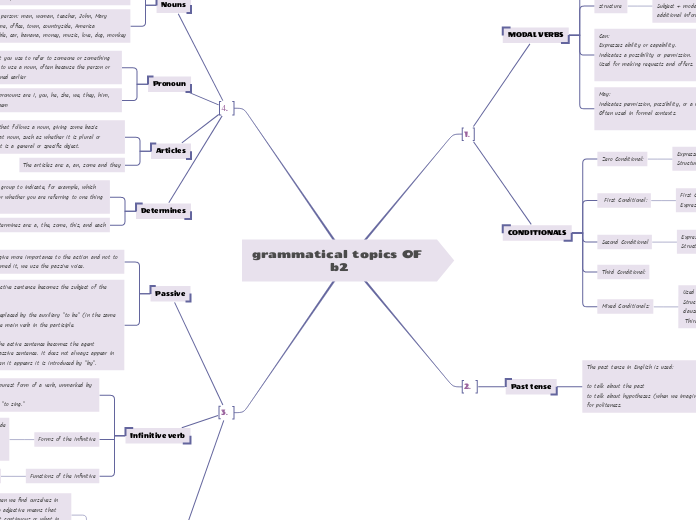arabera dave dave 2 years ago
222
grammatical topics OF b2

arabera dave dave 2 years ago
222

Honelako gehiago
Examples: John Is Reading A Book - John is reading a book.
Verbs in English that end up in «ing» when we find ourselves in English ending in -ing and do not refer to adjective means that they are a verb: we talk about the present continuous or what in Spanish would be.
As a Noun
To + Base Form: The most common form in English. Used in a wide range of contexts. Bare Infinitive: Used after modal verbs (can, could, should, etc.) and in certain other cases.
Estructure: Subject + auxiliary verb (to be) + past participle…
Past perfect continuous:
I had been working
Past perfect:
I had worked
Past continuous:
I was working
Past simple
I worked
Used to express complex or unconventional conditional relationships. Structure: Second conditional (if clause) , Third conditional (main clause) Third conditional (if clause) , Second conditional (main clause)
Examples: If she were here, she would have been excited (past unreal result). If I had known about the party, I would be celebrating with them now
Expresses real possibilities and likely future events. Structure: If + present simple , will + base form of the verb.
Examples: If it rains tomorrow, I will stay home. If she passes the test, she will be happy.
First Conditional: Expresses real possibilities and likely future events.
Examples: If it rains tomorrow, I will stay home. If she passes the test, she will be happy.
Expresses general truths or scientific facts. Structure: If + present simple , present simple.
Examples: If you heat water to 100 degrees Celsius, it boils. If the sun sets, it gets dark.
Might: Suggests a lower level of probability than "may." Commonly used in uncertain or speculative statements.
Añadir texto
Could: Expresses past ability or a polite request. Implies a conditional or hypothetical situation.
Should: Suggests an obligation, advice, or expectation. Used for giving recommendations.
Affirmative structure: Subject + modal verb + base form of the main verb + (optional) additional information.
Negative structure: Subject + modal verb+ not + base form of the main verb + (optional) additional information.
Question structure: Modal verb + subject + base form of the main verb + (optional) additional information?